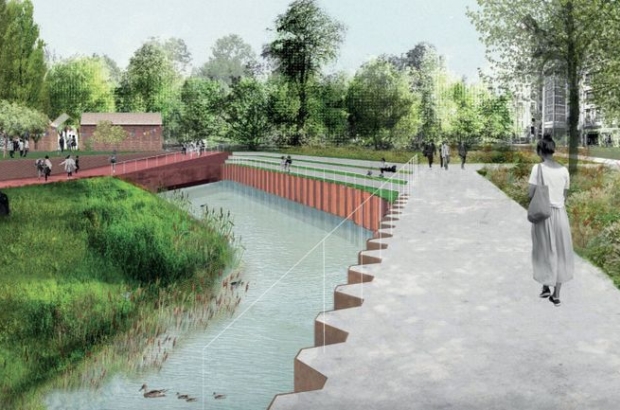- Daily & Weekly newsletters
- Buy & download The Bulletin
- Comment on our articles
Brussels' underground river to finally see light of day
Brussels’ own river, hidden, or more precisely buried, from view in 1871, principally because of hygiene reasons, is to be partially uncovered next year, Brussels secretary of state for urban planning, Ans Persoons has announced.
Persoons confirmed that the capital’s urban development administration Urban.brussels has issued the planning permission required to redevelop the Maximilian park, near Brussels-North station, as part of the Citroën-Vergote urban renewal project.
Notably involving restoration of the Senne river, this plan aims to revitalise many municipalities in Brussels’ northern quarter.
The project that was developed in participation with local residents aims to offer “a corner of the city where nature once again has an essential role”.
“The new Maximilien Park will be a showcase for the new, dynamic and mixed northern neighbourhood,” Persoons added.
The essence of the Max-sur-Senne project, part of this grand plan, is to open up some 650 metres of the Senne river between Place Sainctelette and the Upsite tower near Tour & Taxis and to improve its water quality. The width of the river will vary from 4 to 16 metres, depending on the water level and the location.
Persoons said the reopening of the Senne will also help combat climate change as it will increase the collection of rainwater and can keep the area cooler.
The project will also bring new greenery to what is currently more than 22,000m³ of concrete and ensure the planting of 550 new trees, Brussels environment minister, Alain Maron (Ecolo) said.
He added that the project would “reconnect the district with its history and make it greener, more pleasant to live in and better adapted to climate change”.
Project leaders Brussels Environment will start work in the first half of 2025, with this stretch of the Senne scheduled to be fully opened in 2026. After some 150 years, this will be the first time this small river in the heart of the capital will be restored to its former glory.
A multi-disciplinary team comprising urban planning company OLM along with architecture specialists Evolta, Hbaat and Ouest and Dédale has been commissioned by the Brussels region and city council to design a project to revitalise the whole of the area around the Maximilien urban farm.
The design of the new park aims to enhance the quality of life of local residents and park users as well as boosting nature and biodiversity in the area.
The park will feature a long promenade for pedestrians and cyclists including a two-way cycle path along Quai de Willebroeck. The popular park farm itself, now some 25 years old, will be relocated close to the Foyer Laekenois housing estate near Chaussée d'Anvers.
The renovated Maximilien Park is not only destined to become a green oasis, but it will also connect to other public spaces being renovated, such as Place Sainctelette, which will be transformed into a green meeting space. The new green space will also be linked via the bridge on Place des Armateurs to the Tour & Taxis park, that stretches out until Place Bockstael.
The project, led by the city's environment management organisation Brussels Environment in collaboration with the city of Brussels and the capital's mobility and transport administration, Brussels Mobility, was spearheaded by a participatory process. Several hundred people were interviewed in the area to find out their views.
The announcement of the planning permission comes as the region is facing a “huge financial hole”, Bruzz reported. The announcement of the ambitious project does not mention its price, only that it is largely financed by funds from the Citroën-Vergote urban renewal contract, under the remit of outgoing Brussels minister-president Rudi Vervoort.
Brussels Environment told Bruzz that the total cost of the project is €37.5 million. This amount includes the development of the green spaces, access to the Senne, the new farm, the outdoor spaces for the farm, a new site for the town’s gardeners, the conversion of the old farm, leisure and sports facilities, and new cycle paths and roads.
The cost of opening up the Senne and redeveloping the green space around it has been estimated as €18 million alone.















Comments
Uncover the river so people will have somewhere new to pollute and dump their trash? €37.5 million sounds like a lot of money to spend for just one part of town when Brussels is supposedly in dire financial straights.